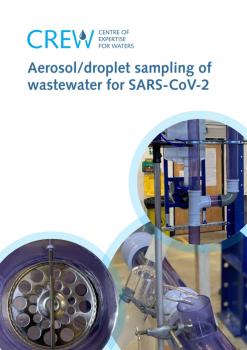
Since the onset of the COVID-19 pandemic in early 2020 - caused by the spread of the SARS-CoV-2 virus - scientists, engineers and epidemiologists have grappled with obtaining information about the extent of the prevalence of infected people in the community in different settings. Understanding community prevalence is an essential component of the fight against the virus, and plays a major role in informing public health officials and help Governments plan for the inevitable waves of infection. Wastewater based epidemiology (WBE), in which the extent of infection in a community can be assessed by sampling and identifying viral RNA in wastewater, has been implemented in Scotland, rest of UK and elsewhere to help provide epidemiology data. This has been very successful in the main, however, the resolution of the system tends to be at wastewater treatment plant (WWTP) catchment level or major sewer lines leading to the WWTP.
In some cases it may be necessary to assess the level of infection close to the source so that data can be obtained at a building or building complex level. This project, led by Prof. Michael Gormley (Heriot Watt University) and sponsored by CREW, sought to investigate and prove the concept of detecting viral RNA in aerosols and droplets found in building sanitary plumbing systems (SPS). The hypothesis tested was that when a toilet (which contains faeces, urine, or vomit of a person infected with SARS-CoV-2) is flushed, the virus will be present in the aerosols and droplets generated within the system, and then be carried in the airstreams. Sampling the airstreams will capture the aerosols and droplets which can then the tested for the presence of viral RNA.
Findings: The research was carried out on a dedicated 2-storey SPS test rig with the capability to flush micro-organisms and detect their transport across two floors of a building. The research demonstrated that viral RNA can be detected using bioaerosol sampling methods within a building’s sanitary plumbing system and so very near-source sampling is possible. The work also identified some practical implications for WBE in this setting, for example, sampling aerosols from SPS is influenced by environmental and water chemistry conditions, e.g. relative humidity and dissolved salts within the system. It was also discovered that the most effective location to detect viral RNA is near the base of the vertical stack or from the horizontal collection drain at the bottom of the vertical stack, just before it connects with the main sewer using passive methods, thus greatly simplifying sampling. This proof of concept investigation has established effective very near-source sampling techniques in a laboratory setting and the next phase will be to test in live buildings which is already underway.
Phosphorus recycling possibilities considering catchment and local agricultural system benefits: a review and regional Scottish case study
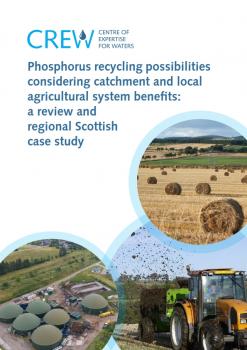
This project was developed to downscale aspects of Scotland’s country-scale phosphorus (P) mass balance by looking at potential for regional recycling. The research firstly examined the background context of P sustainability in terms of recycled P sources, usage opportunities and constraints via a literature review. Secondly a case study, with a waterbody to regional basis, was developed to examine coupling that region’s P-rich resources from wastes with the local agricultural land for goals to both offset the raw imported resource of chemical phosphate fertiliser and limit P pollution of waters. Factors such as material availability, compositions, costs and transport were examined alongside the spatial distribution of agricultural land, crop usage constraints and basic environmental pollution risks.
Initial case study selection of a waterbody with P water quality failure led to examining a rural catchment bordering a city with extensive availability of current and potential recyclable P in excess of the catchment farmland. The inventories of available materials within municipal wastewater and commercial digestate sectors were complex to assemble. To effectively utilise the recycled P masses materials as fertiliser replacement not exceeding crop requirements it was necessary to go beyond the catchment bounds to a larger region of increased planning complexity (in terms of road transport distances, multiple planning boundaries). Simplifications were necessary in the assessment of swapping environmental risks between chemical and recycled P fertiliser forms, since practical tools and models are not yet available across diverse material compositions, soil and crop management combinations.
Dynamic Coast - Coastal Erosion in Scotland
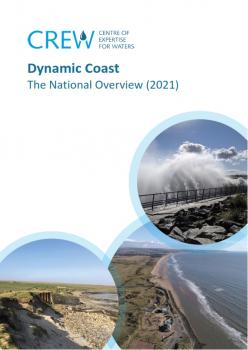
Coastal erosion is widely acknowledged to be a cross cutting issue affecting disparate interests (infrastructure, cultural and natural heritage, port facilities etc.) and
a coordinated approach to align effort across sectors is essential.
The Dynamic Coast was commissioned by CREW to provide the strategic evidence base on the extent of coastal erosion in Scotland. This will support the Scottish Government and the Scottish Public Sector decision-making and indicate areas of highest coastal erosion risk, where a more detailed evidence base may be required. The initial research published in 2017 by CREW, provided businesses and communities with readily interpretable evidence and modelling, based rates. This 2021 publication updates and supersedes the 2017 work, by including increased extents of eroding shoreline and the latest climate change projections on sea level rise, with an aim to help society become ‘sea level wise’ by planning now for our changing climate.
There is international recognition that, for many countries, some of the first and most obvious effects of climate change will be through increased erosion and flood impacts on the coastline. Governments and organisations around the world are undertaking risk assessments to inform and shape new flexible adaptive approaches to better manage these growing risks. Many European partners and fellow UK administrations are searching for more sustainable approaches to address anticipated changes to our coastal assets. As relative sea level continues to rise, and storm impacts increase, many are questioning the assumption that existing artificial coastal defences should be raised and extended. The United Nations Intergovernmental Panel on Climate Change (IPCC) anticipates that the default management approach on the coast will become ‘avoidance and adaptation’ rather than the current ‘hold-the line’ via artificial defences. But where, when and how might adaptation be implemented?
Given the lifespan of Scoland’s coastal infrastructure and other assets, together with the IPCC projections of anticipate climate change, the most appropriate route forward is by framing proposals within the precautionary principle, supported by a robust evidence-base of past changes and modelling of anticipated future changes, checked against appropriate coastal monitoring.
For more information, please visit www.dynamiccoast.com and read the research summary and synopsis below.
Slender Naiad (Najas Flexilis) Habitat - Site Prioritisation
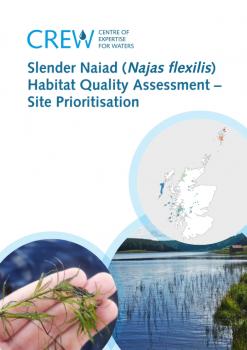
The Slender Naiad (Najas flexilis) is a rare submerged, rooted aquatic plant, typically found in clear-water, lowland lakes. Within the UK sites it is now currently found only in Scotland, with its strongholds historically in Argyll, the Hebrides and Perthshire. Its mainland sites are under increasing threat, primarily from nutrient pollution and competition from invasive non-native species. To help stem the decline of the Slender Naiad and hopefully restore its populations, a research programme was set up and funded by CREW, and carried out by the UK Centre for Ecology & Hydrology in collaboration with the University of Stirling. In the first phase of this project, Gunn and Carvalho (2020), with the support of a number of aquatic plant experts, reviewed the available information on the habitat requirements of the Slender Naiad (https://www.crew.ac.uk/publication/slender-naiad-najas-flexilis-habitat-quality-assessment).
In the second phase of this project, the phase one findings were used to identify lochs in Scotland with suitable habitat for Slender Naiad. It could either be present at these sites yet unrecorded, or they would be lochs to be prioritised for its re-introduction. Suitable sites were first identified using water quality (alkalinity and nutrient) data. Applying a combination of thresholds for alkalinity and nutrient concentrations produced an initial list of 4092 potentially suitable lochs across Scotland. To refine this list, a novel method was developed to use existing data on other aquatic plants to identify habitat suitability. This process was carried out by evaluating a set of 80 “associated” aquatic plant species that have previously been recorded at known Slender Naiad sites. For each of these 80 species an “Indicator Value” score was calculated based on their occupancy and fidelity at sites with, and without, the Slender Naiad. Application of this methodology generated a shorter list of 867 potentially suitable lochs. Further prioritisation of sites on the mainland and sites within 60 km of an existing Slender Naiad sites produced a final short-list of 156 lochs as priority sites for further conservation action.
Of the top 20 ranked sites from the short-list of 156 lochs, the majority occur in Argyll, Dumfries, Galloway, and Stirlingshire, all close to known existing Slender Naiad sites. Additional criteria that could also be used to rank the priority list of sites for further investigations, such as connectivity to other lochs or absence of invasive non-native species in the area, were also highlighted.
It is quite possible that the Slender Naiad may already be present at some of these selected priority sites but may have been missed previously if the site was not surveyed sufficiently, or was previously surveyed too early in the summer season. It is recommended that field surveys be undertaken to first check whether the listed priority lochs hold undiscovered Slender Naiad populations and check the environmental quality (water quality and absence of invasive species). Because of the difficulties in surveying rare submerged aquatic plants, we also recommend sampling loch sediments to check if the seeds of Slender Naiad are present. If it is confirmed through site survey that the slender Naiad is not present, and that these lochs still meet the species’ environmental requirements, then these would be strong candidates for either the re-introduction of the Slender Naiad.
Developing a probabilistic risk model to estimate phosphorus, nitrogen and microbial pollution to water from septic tanks
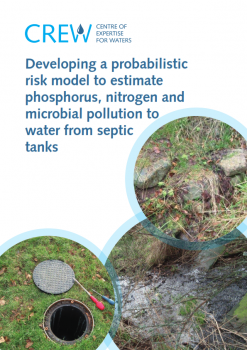
Septic tank systems (STS) are private sewage treatment facilities which typically serve the population not connected to main sewer networks. There is substantial uncertainty about the impact of septic tanks on water quality, primarily because of a lack of information about the location, number and condition, and inadequate monitoring of the effects of septic tank discharges to surface water and groundwater.
Under the requirements of the Water Framework Directive, there is a need for SEPA to identify pressures contributing to water quality downgrades and to put in place appropriate and feasible measures to return waters to good status. SEPA currently use the SAGIS model to identify major pollutants including phosphorus (P) loads and concentrations at the waterbody scale. However, assumptions regarding parameterisation and uncertainty of SAGIS model outputs, particularly in rural areas, make it difficult to quantify the sources of P pollution from septic tanks. A new approach to modelling the contribution of STS P loading is therefore required to inform mitigation strategies, while accounting for uncertainties.
The aim of this project was to review the literature and develop a new probabilistic modelling approach, based on Bayesian Belief Networks (BBN), to improve understanding of soluble reactive phosphorus (SRP) losses to surface water from STS. This was initially undertaken for seven pilot catchments and then at a national scale. The model included a range of risk factors related to SRP losses from STS, resulting in simulated SRP losses that were comparable with previously available estimates. The project also considered what factors would need to be applied for modelling nitrogen (N) and microbial (FIOs) pollution risk from STS.
Key findings indicate that: (1) Poor performance of a large proportion of STS and hence the risk of SRP leaching to water bodies are related to the lack of proper soakaway system, poor soil quality, undersized STS, and lack of maintenance. Hence the literature review suggested multiple risk factors contributing to STS pollution risk to watercourses need to be considered when simulating SRP losses; (2) Model sensitivity analysis identified STS effluent concentration, STS density, and connectedness as the most important risk factors; (3) Upgrading of STS treatment to secondary or tertiary level, improving STS maintenance and/or disconnecting STS direct discharges to watercourses would be most effective in mitigating SRP losses at catchment scale; (4) The model could be adapted relatively easily to simulate microbial (faecal indicator organisms) and nitrogen losses from STS to surface water. A detailed catchment-based survey of STS condition would be beneficial to validate and improve BBN model parameterisation.
Water Breakthrough Challenge
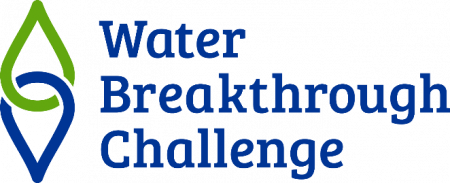
The first Water Breakthrough Challenge is now open. The Challenge, delivered by Ofwat and Nesta Challenges supported by Arup, is calling for ambitious, innovative projects which can drive long-lasting benefits for customers, society and the environment. Water companies in England and Wales can apply for between £1 million and £10 million in funding to deliver initiatives they would otherwise be unable to invest in or explore, and are actively encouraged to enter in partnership with organisations within and outside the water sector. Entries close on 3 June. Selected entrants will be invited to submit further details from 28 June, with the winners to be announced in September 2021.
Please click on the Water Breakthrough Challenge communications word document below for more information, website link and contact details. We encourage you all to share this opportunity within your own organisations and networks. The comms pack includes a full press release, suggested social posts and media assets.
Review of wastewater monitoring applications for public health and novel aspects of environmental quality
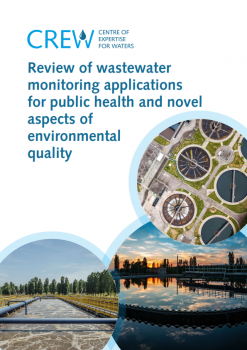
Wastewater-based epidemiology (WBE) has received increasing attention over the past year across the world. In the UK, local, regional and national wastewater monitoring programmes were established in 2020 to detect severe acute respiratory syndrome coronavirus (SARS-CoVID-2) patterns in human sewage to monitor outbreaks. The establishment of these monitoring programmes has seen considerable investment into establishing the infrastructure, methodology and resources needed to sample, analyse, and interpret data from WBE. Whilst coronavirus has so far been the primary focus of these programmes, it is widely acknowledged that wastewater contains a diverse amount of chemical and biological information that can be used for wider public health purposes. The aim of this project was to review the literature on where else WBE could be utilised to inform public health.
The key findings indicate that there are only a very few technology ready applications of WBE. These include: (1) Estimation of community wide illicit drug usage; (2) Estimation of lifestyle chemical usage: alcohol, nicotine and caffeine; (3) Infectious disease tracking (e.g. polio, SARS-CoV-2); (4) Estimation of disease prevalence based on pharmaceutical usage.
The forementioned applications require significant infrastructure, including specialised staff to undertake sampling and sample preparation as well as an investment in analytical instrumentation. There is a clear potential to apply WBE in:
- Estimation of community-wide exposure to hazardous chemicals. Some initial work indicates that wastewater can provide information on community wide exposure to pesticides and industrial chemicals, which are linked with either occupational exposure or lifestyle choices.
- Prevalence of non-communicable disease (NCD). Current WBE approaches allow for estimation of pharmaceutical usage to treat, e.g. diabetics, cardiovascular disease or mental health conditions.
WaterWall in Motion
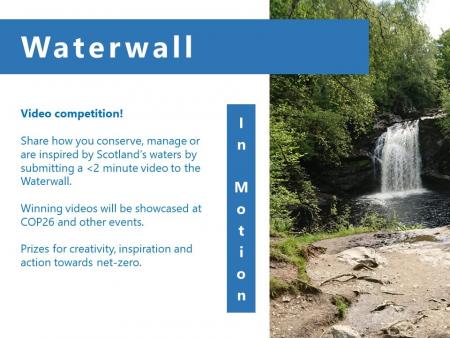
WaterWall in Motion
Working in partnership with the Scottish water community, CREW has developed the WaterWall in Motion – a project that promises to be a fantastic video resource and competition to celebrate Scotland’s relationship with water, and its Hydro Nation ambition. The aim is to celebrate how Scotland is leading the way in water research, innovation, management, business, creativity, health, art and recreation.
The project is open to the public and any organisation, business or individual working to monitor, research, innovate, manage, regulate, conserve or simply enjoy and value Scotland’s water resources. The existing WaterWall, developed at the James Hutton Institute, has been enhanced to accommodate videos and the water community is invited to post links to 2-minute videos on one of eight themes
· Nature-based solutions
· Droughts and floods
· Water quality
· Living with climate change
· Freshwater restoration
· Innovation in the water sector
· Water and wellbeing
· Water inspired creativity
Prizes will be awarded across categories for innovation, creativity, originality; actions for achieving net zero carbon emissions and most impactful (evocative, celebratory or inspirational video).
This project aims to showcase and raise the profile of Scotland as the Hydro Nation at COP26 and satellite events, as well as to provide a point of reference for the water community to aid in the development of new networks and opportunities in the water sector. The WaterWall in Motion project was launched at World Water Day 2021. The competition will run until the 7th January 2022 with a prizing giving event planned at World Water Day in 2022.
Please click on the WaterWall poster pdf below to access information on how to create and upload your video.
We must start to truly value water
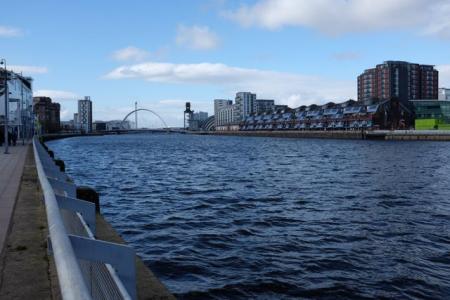
Making up 70% of our world, it’s what justifies us as the Blue Planet, spinning in space. Without it there would be no life. It is the lifeblood of industry: 90% of the global economy and 75% of jobs depend on water to some extent. But it is in crisis through our accelerating lifestyles and attendant demands on its use and overuse, and also because of climate change. Indeed, in many ways it is the messenger of climate change - ninety percent of all natural disasters are water related and these increasingly impact on more and more people across the globe. In short, it’s time to change our relationship with water.
In a water-rich country like Scotland we tend to take it for granted. Turn on the tap and it’s there, aim to go for a walk and bucket loads fall from the sky. It’s beloved of taxi drivers nationwide. But that’s not true across the globe. The arrival of rain is cherished and welcomed in some countries and in others the overuse of a once abundant resource is placing increasing constraints on livelihoods and the escape from poverty. The quantity of water has not changed, indeed that has not changed since dinosaurs roamed the world, but that water is finite and under threat. In many situations it is the quality of water and its distribution in time and space that are the problem: too much here; too little there. It’s not a level playing field, and demand for water keeps rising as society’s demands grow and cities develop.
And not all water is equal. We have blue water in our rivers and lakes, green water being drawn up to support plant and crop growth, grey, brown and black water in our waste-streams. We drink tap water, mineral water, sparking water, well-water, distilled water and product manufacturers probably aim to market even more subtle “types of water”. It can come from different sources: raw water from the hills, brackish water, groundwater, rainwater or wastewater. But basically, it is still just H2O.
So why is this important? Simply because we depend for our survival on these different types of water that we put to different uses and all of which have different values. But again; define value. To many it’s the simple pounds, shillings, and pence of the water market. What does it cost to make it fit to drink or use and what does it cost to clean it up afterwards? Water, though, has value that transcends money. It has spiritual or religious significance. It has value for mental wellbeing; the mindfulness of hearing the patter of water on a roof, trickling in a burn or waves lapping on a beach; the moods of rainfall, rainbows and cascades; the feel of it on our skin. What value do we place on those attributes, and how do we assess them against the hard economic costs? That’s the challenge.
Our waste streams, historically the polluter of many of our country’s beautiful rivers are now highly valued for their embedded nutrients, metals and energy, all of which can be recovered and reused. Scottish Water has a new, world-leading target of attaining net-zero by 2040. Our new approaches to protecting cities from floods based on wider ecologically-based measures provide value not only in their primary function, but also because they provide prized ‘blue-green’ recreational spaces, important corridors for wildlife and settings for desirable and usually expensive real estate.
Our relationship with water is changing and must continue to change. Truly valuing water means giving it appropriate recognition, promoting efficiency and balancing short-term need against longer-term sustainability. Thinking about our legacy to others.
This article was written by Prof. Bob Ferrier, Director of CREW and the Hydro Nation International Centre (HNIC) and was originally published in the Scotsman.
Lags in water quality response to diffuse pollution control measures: a review
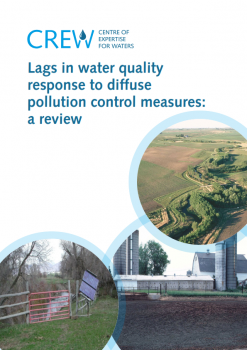
A systematic review of evidence on lags in water quality response to diffuse pollution control measures implemented in Scotland is reported. The review focused on key pollutants in catchments smaller than 300 km2 in temperate regions. Findings were evaluated based on catchment typologies (e.g. catchment size, precipitation, land use, pollutant residence time, and soil /waterbody type) and data/analyses (e.g. monitoring design and record length). There was no evidence supporting fixed timeframes for a water quality response to measures or catchment typology -based lags. Observed lags varied: 1-25 years for river pollutants and potentially longer than 20 years for groundwater nitrate. Long-term water quality and catchment data are key to quantifying lags. It is recommended to keep monitoring and adjust expectations by planning for longer-term lags.




